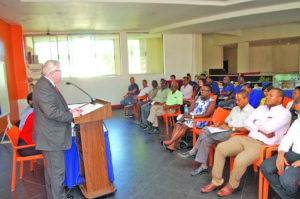
If all goes as planned, onions and potatoes will be produced on a large scale in Guyana, according to Deputy Project Director of World University Service of Canada (WUSC) Caribbean, Munesh Persaud.
“Tasting is believing…,” were the words of Persaud as he declared that the result of the trial project in Guyana hints to a promising future for the large-scale production of onion and potatoes on local soil.
Persaud was speaking at a Taste Testing Event hosted by WUSC and Government of Canada Funded PROPEL (Promotion of Regional Opportunities for Produce through Enterprises and Linkages) project in collaboration with the Guyana Marketing Corporation, on Wednesday afternoon at the Pegasus Hotel in Kingston, Georgetown.
Canadian High Commissioner, Pierre Giroux, is optimistic that the economy of Guyana can be diversified while ensuring food security, as he commended the success of the local onion and potato cultivation in a keynote address at the ‘taste testing’ event where dishes were prepared with local production (of onions and potatoes) and attended by representatives of the Agriculture and Finance Ministries, members of the Private Sector and staff of the National Agricultural Research and Extension Institute (NAREI) among other patrons.
Country Coordinator of PROPEL, Marissa Lowden, in her opening remarks highlighted the success of the implementation as she welcomed the gathering to savour the “taste of success”.
Persaud said the aim of the event was to seek the feedback of the “real Guyanese” given the vitality of the response of the market. Persaud emphasised that Jamaica’s large-scale cultivation plays an important role in mobilising capital (in the agricultural sector) as they produce 80 per cent of potatoes consumed by the populace.
The High Commissioner of Canada made reference to Guyana’s ridiculously high 2015 onion import bill, saying that the implementation of such a project substitutes the utilisation of these monies for other purposes. He pointed out that that project serves to diversify the economy and alter the monoculture history of agriculture.
Giroux concluded that the next stage, now that the cultivation of these crops has become a reality, is to increase the scale of production and market as he encouraged partnerships between Government and the Private Sector.
Areas chosen for cultivation include Ibini in Region 10 (Upper Demerara-Berbice), Region Nine (Upper Takatu-Upper Essequibo) spanning several villages from Annai in the North to Aishalton in Deep South Rupununi and Kato in Region Eight (Potaro-Siparuni).
Targeting implementation in five Caribbean countries – Barbados, Dominica, Guyana, Jamaica, and St Lucia – PROPEL works with Private Sector buyers, producers and Governments to support small- to medium-scale producers in the Caribbean.
The organisation seeks to work with processors and related businesses to increase the supply of agricultural products – particularly fresh produce – to high value markets (supermarkets, hotels and traders) including exporters and importers, in and around the Caribbean.



